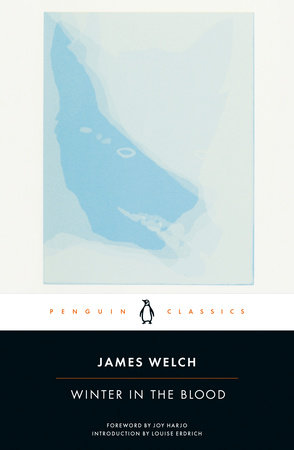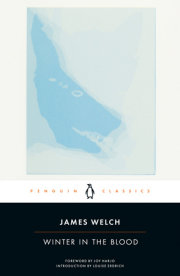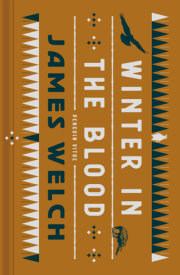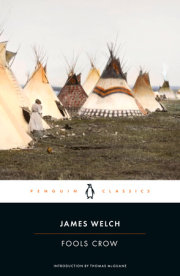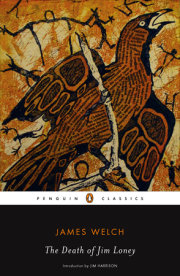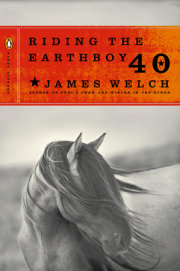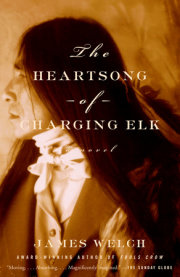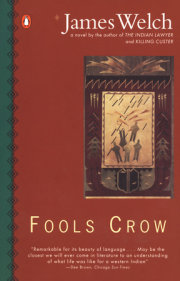Part One
1
In the tall weeds of the borrow pit, I took a leak and watched the sorrel mare, her colt beside her, walk through burnt grass to the shady side of the log-and-mud cabin. It was called the Earthboy place, although no one by that name (or any other) had lived in it for twenty years. The roof had fallen in and the mud between the logs had fallen out in chunks, leaving a bare gray skeleton, home only to mice and insects. Tumbleweeds, stark as bone, rocked in a hot wind against the west wall. On the hill behind the cabin, a rectangle of barbed wire held the graves of all the Earthboys, except for a daughter who had married a man from Lodgepole. She could be anywhere, but the Earthboys were gone.
The fence hummed in the sun behind my back as I climbed up to the highway. My right eye was swollen up, but I couldn't remember how or why, just the white man, loose with his wife and buying drinks, his raging tongue a flame above the music and my eyes. She was wild, from Rocky Boy. He was white. He swore at his money, at her breasts, at my hair.
Coming home was not easy anymore. It was never a cinch, but it had become a torture. My throat ached, my bad knee ached and my head ached in the even heat.
The mare and her colt were out of sight behind the cabin. Beyond the graveyard and the prairie hills, the Little Rockies looked black and furry in the heat haze.
Coming home to a mother and an old lady who was my grandmother. And the girl who was thought to be my wife. But she didn't really count. For that matter none of them counted; not one meant anything to me. And for no reason. I felt no hatred, no love, no guilt, no conscience, nothing but a distance that had grown through the years.
It could have been the country, the burnt prairie beneath a blazing sun, the pale green of the Milk River valley, the milky waters of the river, the sagebrush and cottonwoods, the dry, cracked gumbo flats. The country had created a distance as deep as it was empty, and the people accepted and treated each other with distance.
But the distance I felt came not from country or people; it came from within me. I was as distant from myself as a hawk from the moon. And that was why I had no particular feelings toward my mother and grandmother. Or the girl who had come to live with me.
I dropped down on the other side of the highway, slid through the barbed-wire fence and began the last two miles home. My throat ached with a terrible thirst.
2
"She left three days ago, just after you went to town."
"It doesn't matter," I said.
"She took your gun and electric razor."
The room was bright. Although it was early afternoon, the kitchen light was burning.
"What did you expect me to do? I have your grandmother to look after, I have no strength, and she is young-Cree!"
"Don't worry," I said.
"At least get your gun back." My mother swept potato peels off the counter into a paper sack at her feet. "You know she'd sell it for a drink."
The gun, an old .30-30, had once been important to me. Like my father before me, I had killed plenty of deer with it, but I hadn't used it since the day I killed Buster Cutfinger's dog for no reason except that I was drunk and it was moving. That was four years ago.
I heard a clucking in the living room. The rocking chair squeaked twice and was silent.
"How is she?" I asked.
"Hot cereal and pudding-how would you expect her to be?"
"What, no radishes?"
My mother ignored me as she sliced the potatoes into thin wafers.
"Why don't we butcher one of those heifers? She could eat steak for the rest of her life and then some."
"She'll be gone soon enough without you rushing things. Here, put this on that eye-it'll draw out the poison." She handed me a slice of potato.
"How's Lame Bull?"
She stopped slicing. "What do you mean by that?"
"How's Lame Bull?"
"He'll be here this evening; you can find out then. Now get me another bucket of water."
"How's the water?" I asked.
"It'll do. It never rains anymore." She dumped the slices into a pan. "It never rains around here when you need it."
I thought how warm and flat the water would taste. No rain since mid-June and the tarred barrels under the eaves of the house were empty. The cistern would be low and the water silty.
A fly buzzed into the house as I opened the door. The yard was patched with weeds and foxtail, sagebrush beyond the fence. The earth crumbled into powder under my feet; beneath the sun which settled into afternoon heat over the slough, two pintail ducks beat frantically above the cottonwoods and out of sight. As I lowered the bucket into the cistern, a meadowlark sang from the shade behind the house. The rope was crusty in my hands. Twice I lifted and dropped the bucket, watching the water flow in over the lip until the bucket grew heavy enough to sink.
The girl was no matter. She was a Cree from Havre, scorned by the reservation people. I had brought her home with me three weeks ago. My mother thought we were married and treated her with politeness. My mother was a Catholic and sprinkled holy water in the corners of her house before lightning storms. She drank with the priest from Harlem, a round man with distant eyes, who refused to set foot on the reservation. He never buried Indians in their family graveyards; instead, he made them come to him, to his church, his saints and holy water, his feuding eyes. My mother drank with him in his shingle house beside the yellow plaster church. She thought I had married the girl and tried to welcome her, and the girl sat sullen in the living room across from the old lady, my grandmother, who filled her stone pipe with cuts of tobacco mixed with dried crushed chokecherries. She sat across from the girl, and the girl read movie magazines and imagined that she looked like Raquel Welch.
The old lady imagined that the girl was Cree and enemy and plotted ways to slit her throat. One day the flint striker would do; another day she favored the paring knife she kept hidden in her legging. Day after day, these two sat across from each other until the pile of movie magazines spread halfway across the room and the paring knife grew heavy in the old lady's eyes.
3
I slid down the riverbank behind the house. After a half-hour search in the heat of the granary, I had found a red and white spoon in my father's toolbox. The treble hook was rusty and the paint on the spoon flecked with rust. I cast across the water just short of the opposite bank. There was almost no current. As I retrieved the lure, three mallards whirred across my line of vision and were gone upriver.
The sugar beet factory up by Chinook had died seven years before. Everybody had thought the factory caused the river to be milky but the water never cleared. The white men from the fish department came in their green trucks and stocked the river with pike. They were enthusiastic and dumped thousands of pike of all sizes into the river. But the river ignored the fish and the fish ignored the river; they refused even to die there. They simply vanished. The white men made tests; they stuck electric rods into the water; they scraped muck from the bottom; they even collected bugs from the fields next to the river; they dumped other kinds of fish in the river. Nothing worked. The fish disappeared. Then the men from the fish department disappeared, and the Indians put away their new fishing poles. But every now and then, a report would trickle down the valley that someone, an irrigator perhaps, had seen an ash-colored swirl suck in a muskrat, and out would come the fishing gear. Nobody ever caught one of these swirls, but it was always worth a try.
I cast the spoon again, this time retrieving faster.
The toolbox had held my father's tools and it was said in those days that he could fix anything made of iron. He overhauled machinery in the fall. It was said that when the leaves turned, First Raise's yard was full of iron; when they fell, the yard was full of leaves. He drank with the white men of Dodson. Not a quiet man, he told them stories and made them laugh. He charged them plenty for fixing their machines. Twenty dollars to kick a baler awake-one dollar for the kick and nineteen for knowing where to kick. He made them laugh until the thirty-below morning ten years ago we found him sleeping in the borrow pit across from Earthboy's place.
He had had dreams. Every fall, before the first cold wind, he dreamed of taking elk in Glacier Park. He planned. He figured out the mileage and the time it would take him to reach the park, and the time it would take to kill an elk and drag it back across the boundary to his waiting pickup. He made a list of food and supplies. He inquired around, trying to find out what the penalty would be if they caught him. He wasn't crafty like Lame Bull or the white men of Dodson, so he had to know the penalty, almost as though the penalty would be the inevitable result of his hunt.
He never got caught because he never made the trip. The dream, the planning and preparation were all part of a ritual-something to be done when the haying was over and the cattle brought down from the hills. In the evening, as he oiled his .30-30, he explained that it was better to shoot a cow elk because the bulls were tough and stringy. He had everything figured out, but he never made the trip.
My lure caught a windfall trunk and the brittle nylon line snapped. A magpie squawked from deep in the woods on the other side of the river.
4
"Ho, you are fishing, I see. Any good bites?" Lame Bull skittered down the bank amid swirls of dust. He stopped just short of the water.
"I lost my lure," I said.
"You should try bacon," he said, watching my line float limp on the surface. "I know these fish."
It was getting on toward evening. A mosquito lit on Lame Bull's face. I brought in the line and tied it to the reel handle. The calf bawled in the corral. Its mother, an old roan with one wild eye, answered from somewhere in the bend of the horseshoe slough.
"You should try bacon. First you cook it, then dump the grease into the river. First cast, you'll catch a good one."
"Are the fish any good?" I asked.
"Muddy. The flesh is not firm. It's been a poor season." He swatted a cloud of dust from his rump. "I haven't seen such a poor year since the flood. Ask your mother. She'll tell you."
We climbed the bank and started for the house. I remembered the flood. Almost twelve years ago, the whole valley from Chinook on down was under water. We moved up to the agency and stayed in an empty garage. They gave us typhoid shots.
"You, of course, are too young."
"I was almost twenty," I said.
"Your old man tried to ride in from the highway but his horse was shy of water. You were not much more than a baby in Teresa's arms. His horse threw him about halfway in."
"I remember that. I was almost twenty."
"Ho." Lame Bull laughed. "You were not much more than a gleam in your old man's eye."
"His stirrup broke-that's how come the horse threw him. I saw his saddle. It was a weakness in the leather."
"Ho."
"He could outride you any day."
"Ho."
Lame Bull filled the width of the doorframe as he entered the kitchen. He wasn't tall, but broad as a bull from shoulders to butt.
"Ah, Teresa! Your son tells me you are ready to marry me."
"My son tells lies that would make a weasel think twice. He was cut from the same mold as you." Her voice was clear and bitter.
"But why not? We could make music in the sack. We could make those old sheets sing."
"Fool...you talk as though my mother had no ears," Teresa said.
Two squeaks came from the living room.
"Old woman! How goes the rocking?" Lame Bull moved past my mother to the living room. "Do you make hay yet?"
The rocking chair squeaked again.
"She has gone to seed," I said. "There is no fertilizer in her bones."
"I seem to find myself surrounded by fools today." Teresa turned on the burner beneath the pan filled with potatoes. "Maybe one of you fools could bring yourself to feed that calf. He'll be bawling all night."
Evening now and the sky had changed to pink reflected off the high western clouds. A pheasant gabbled from a field to the south. A lone cock, he would be stepping from the wild rose along an irrigation ditch to the sweet alfalfa field, perhaps to graze with other cocks and hens, perhaps alone. It is difficult to tell what cocks will do when they grow old. They are like men, full of twists.
The calf was snugged against the fence, its head between the poles, sucking its mother.
"Hi! Get out of here, you bitch!"
She jumped straight back from the fence, skittered sideways a few feet, then stood, tensed. Her tongue hung a thread of saliva almost to the ground and the one wild eye, rimmed white, looked nowhere in particular.
"Don't you know we're trying to wean this fool?"
I moved slowly toward the calf, backing it into a corner where the horse shed met the corral fence, talking to it, holding out my hand. Before it could move I grabbed it by the ear and whirled around so that I could pin its shoulder against the fence. I slapped a mosquito from my face and the calf bawled; then it was silent.
Feeling the firmness of its thigh, I remembered how my brother, Mose, and I used to ride calves, holding them for each other, buckling on the old chaps we found hanging in the horse shed, then the tense "Turn him out!" and all hell busted loose. Hour after hour we rode calves until First Raise caught us.
Copyright © 2021 by James Welch. All rights reserved. No part of this excerpt may be reproduced or reprinted without permission in writing from the publisher.

